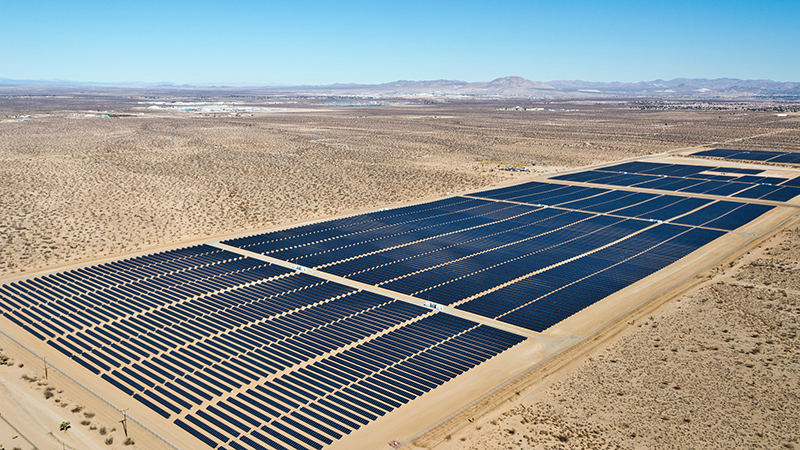Fox News seems an unlikely candidate to invest in clean energy and tackle climate change.
The right-wing news channel is a regular platform for climate sceptics, yet its parent company 21st Century Fox has committed to a 25% cut in the greenhouse gas emissions intensity of its output.
While its high profile news anchors frequently berate the proliferation of renewables and ‘war on coal’, the organisation’s Los Angeles studios boast a 1.5 megawatt solar installation, according to the Climate Group NGO.
It’s a small step in what is a huge global challenge, but Fox is following a well-worn path in the US, which is seeing fast growth in renewables driven by businesses.
Intriguing graph from @AWEA showing how biz is driving US wind investment pic.twitter.com/2V408IWSOp
— Climate Home News (@ClimateHome) August 18, 2016
BT, Google, Apple, AstraZeneca, CocaCola, Goldman Sachs and HP are among multinationals that say they will soon run operations on 100% renewables.
“We are seeing a significant transition,” says Andy Griffiths, UK head of environmental sustainability at food giant Nestle.
In June the maker of Kit Kat, Shreddies and Nescafe announced a 15-year investment in a Scottish wind farm.
When it comes online in 2017 the 125 gigawatt hours (GWh) of electricity it will generate every year will meet 50% of the company’s electricity needs, taking its green power supply up to 100%.
The long term contract and price guarantee made the project a fairly straightforward choice, says Griffiths.
“The primary focus is to deliver a positive environmental impact in a commercially appropriate way,” he adds. Nestle has already signed off on similar projects in Mexico, Spain, Brazil and the US.
Analysis: Seven signs a clean energy revolution is under way
Letha Tawney is based in what many argue is a heartland of the clean energy revolution: the US East Coast.
Head of utility innovation at the World Resources Institute, she says demand from business for low carbon power is now growing fast across the US.
“It is a trend that has picked up steam driven by plummeting cost of renewables,” she tells Climate Home.
“It’s driven by companies wanting to be ahead of regulatory risks in markets and wanting to be responsive to stakeholders.”
Membership numbers of low carbon business clubs do appear to be on the rise. At the start of 2015 the RE100 initiative had 15 companies signed up.
1000 business commitments to climate change, including all 69 for #RE100 https://t.co/K16oqJ56pE #WeMeanIt pic.twitter.com/bfv8AHyXCh
— RE100 (@theRE100) August 16, 2016
It now has nearly 70 multinationals with more expected to be revealed during New York Climate Week next month.
It counts Walmart, Unilever, Tata Motors and SAP as signatories to a pledge to source all their power from the wind and sun – in some cases by the end of this decade.
The implications for avoiding dangerous levels of climate change are significant. According to the RE100 initiative, 15% of greenhouse gas emissions could be culled should all companies bet on renewables.
To meet rising interest the Renewable Energy Buyer’s Alliance (REBA) was launched in May, backed by the Rocky Mountain Institute, an organization focused on sustainability and climate change.
“Access to clean energy is one of the key criteria we use when choosing where to put a data center,” said Bill Weihl, Facebook’s sustainability director and one of REBA’s founding members.
As part of an agreement that brought Facebook to Iowa, the state agreed to approve a new 140-megawatt wind farm, he added in quotes reported by Bloomberg.
Weekly briefing: Sign up for your essential climate politics update
Analysts say the impact of business investment has been dramatic, particularly in wind-friendly Texas and sun-blessed California.
According to the American Wind Energy Association (AWEA) business accounted for over half of US wind power purchases in 2015, double 2014 figures. In total 3.6GW of clean power were bought in through 2015 and the first quarter of 2016.
“Every time Americans use the Internet or do laundry, it’s more likely that wind energy made it possible,” boasts the association’s CEO Tom Kiernan.
Participating businesses are quick to highlight their involvement. In an email a Google spokesperson said the company was proud its data centres were the “most efficient” on the planet.
“We’ve signed contracts to purchase nearly 2.5GW of renewable energy – equal to taking over 1 million cars off the road,” they said.
In addition the company claims the state of Georgia has agreed to develop 1,700MW of new renewables as a direct result of pressure from the data giant and other businesses.
“We participated in the regulatory process to encourage Georgia Power to adopt more, cost effective renewables, and enable commercial and industrial customers to directly procure renewable power in the state,” the Google Green Blog explains.
Report: Solar is now cheaper than coal, says India energy minister
Still, with solar prices tumbling to rock bottom levels in equatorial regions and wind technology fast improving, there’s now a sound economic element to ditching fossil fuels, argues Tawney.
“Amazon is a thin margin business and pursuing it aggressively, Walmart also works on thin margins. Renewables are part of a strategy to reduce costs in supply chains,” she says.
And Nestle’s Griffiths agrees with the economic angle, pointing to the lack of evidence that a greener energy system will necessarily help his company sell more Nesquik or Shredded Wheat.
“In terms of how it affects purchasing it’s still not significant and I suspect it’s not going to be a positive driver in terms of purchasing behavior,” he says.
